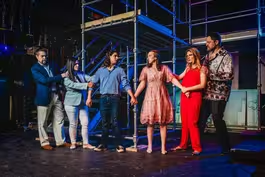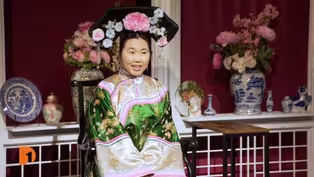
Rose Morton traces her ancestry in ‘Our Family’s Keepers’
Clip: Season 8 Episode 32 | 6m 8sVideo has Closed Captions
Rose Morton unravels her family’s history of slavery in her book “Our Family’s Keepers.”
For many African Americans, tracing their family’s past can come with challenges. Rose Morton, a local woman set out to learn about her enslaved ancestors and the families that owned them. She talks about her quest for identity, her book “Our Family’s Keepers,” and the profound impact of what she learned about her family and the people connected to a South Carolina plantation.
Problems playing video? | Closed Captioning Feedback
Problems playing video? | Closed Captioning Feedback
One Detroit is a local public television program presented by Detroit PBS

Rose Morton traces her ancestry in ‘Our Family’s Keepers’
Clip: Season 8 Episode 32 | 6m 8sVideo has Closed Captions
For many African Americans, tracing their family’s past can come with challenges. Rose Morton, a local woman set out to learn about her enslaved ancestors and the families that owned them. She talks about her quest for identity, her book “Our Family’s Keepers,” and the profound impact of what she learned about her family and the people connected to a South Carolina plantation.
Problems playing video? | Closed Captioning Feedback
How to Watch One Detroit
One Detroit is available to stream on pbs.org and the free PBS App, available on iPhone, Apple TV, Android TV, Android smartphones, Amazon Fire TV, Amazon Fire Tablet, Roku, Samsung Smart TV, and Vizio.
Providing Support for PBS.org
Learn Moreabout PBS online sponsorship(peaceful music) (melancholy music) (melancholy music continues) - [Daijah] Rose Ella Morton's journey tracing her ancestors took her to the Middleton Plantation in Charleston, South Carolina in 2002 where she discovered her direct relationship to a key figure in the American Revolutionary War.
- This would be my great-grandfather, Goodloe Harper Yancey, because he's the one they had a baby by, yeah.
- Ella?
- Yeah, he had Ella.
- You did something so powerful and so unique.
You took a trip down your ancestral history, literally.
Take me back to the beginning.
Tell me about that.
- I was in front of my mother's house one day.
And I was picking up my kids.
And my brother was outside.
And he had been doing research and he had some pictures.
And he said, "Look at this picture.
"This is our last slave owner."
I said: What?
I said: Let me see.
And as soon as I saw the picture, I kind of like froze.
I got scared.
I couldn't understand what I was feeling.
Something about his face.
I felt he could hurt me right there on the spot.
I felt like he could control me.
It was just, I was afraid.
And I didn't like the feeling I felt; it was really weird.
And that's what got me all involved to wanna find out what had me so afraid.
- You tied together all of these different pieces that led you to different plantations.
You even wrote a book that highlights the story.
Tell me about your journey with acquiring all of the different documents.
- We went through the libraries.
I start doing my ancestry search on family trees and stuff and going through that.
And my brother, he had started at about 16 years old.
He was going down to my grandmother's house in Alabama.
And he would ask her, she was still alive then.
He would ask her about things and she would tell him stories.
At that time, I wasn't interested in everything.
But then all the stories she told helped me enter my journey because I started putting all that stuff together.
- And I know that, of course, you did a lot of the research.
And I know that your brother helped you along the way.
- Right, my brother did have a couple of pictures.
After I started journeying out into the slave owners, he wanted me to...
He said, "Don't bother with them."
He said, "Just keep it in... "Just find out things about the Black side, "the slaves, the ancestors.
"We don't wanna go into that part."
And I said to myself: That doesn't make sense.
I said: In order for me to find out more about my people, I gotta find the White people that had them.
So that's when I started.
I took it out towards going to find the White slave owners and stuff and going to the plantations and stuff.
I started out collecting information.
My brother had pulled up something about the plantations and everything that they were on.
And it was like three plantations.
And the story sounded real good.
I said, you know what?
I think I'm going to visit every plantation my ancestors were enslaved.
He said, "Well, if you're gonna take a visit, "I wanna go with you."
So that started off my first trip.
So we went to Charleston, South Carolina.
It was in February, 2002.
We went to the Middleton Plantation.
- When you went back to these plantations, you were essentially, in a way, traveling back in time.
What was the feeling that you felt when you were there?
- As soon as I got on the ground, I could feel, like I said, I could feel it move up under my feet and everything.
It was kind of, it was beautiful.
It was beautiful.
But I also know, you don't go back to an ancestors' place where your ancestors was at, where they slaved and died, without them coming back with you, some coming back when you leave.
So some of 'em did follow me back.
I know they did.
- So you are a part of the Daughters of the American Revolution, which not many Black women are a part of.
How did you become a part of that group?
- My great-grandmother, Ella, who I'm named after, Ella Snow, she's a product of the slave master's son.
His name was Goodloe Harper Yancey.
And she couldn't tell nobody that was her father.
Her great grandfather, which was named James Yancey, served in the American Revolutionary War.
And so that was my connection.
- What does it mean to you to be a part of the Daughters of the American Revolution as a Black woman?
- The first Black woman, she joined the group in 1977.
And the reason that I joined was not I'm so patriotic.
I'm not.
The main purpose, which only I care about, is to take in my grandmother, great-grandmother from the position of couldn't claim her father to her record being in Washington that she is the daughter of this man.
And that's what I wanted.
- And I'm sure that you plan to pass this journey along to the generations to come.
Why is it important for them to have access to this information and to be able to continue that legacy?
- Well, I don't want them to ever be ashamed of where they came from.
And I want them to know, it was very important people, that they were strong.
And they had to be strong so they could survive, you know.
Certain times bring about different feelings.
Like right now, we're in the feeling where everybody wants to find out.
But will they wanna find out?
Will they really care about it?
I really don't know.
But if they do, everything is there for them.
Gospel singer Kevin Stewart performs at Greater Grace Temple
Video has Closed Captions
Clip: S8 Ep32 | 3m 24s | Gospel singer Kevin Stewart performs “Come by Here” at Greater Grace Temple in Detroit. (3m 24s)
One Detroit Weekend: February 9, 2024
Video has Closed Captions
Clip: S8 Ep32 | 1m 49s | Find out what’s happening in and around Detroit this weekend on “One Detroit Weekend.” (1m 49s)
‘The Chinese Lady’ makes its Michigan premiere in Northville
Video has Closed Captions
Clip: S8 Ep32 | 7m 14s | Lloyd Suh’s play about the first Chinese woman to arrive in America premieres in Michigan. (7m 14s)
Providing Support for PBS.org
Learn Moreabout PBS online sponsorship
- News and Public Affairs

Top journalists deliver compelling original analysis of the hour's headlines.

- News and Public Affairs

FRONTLINE is investigative journalism that questions, explains and changes our world.












Support for PBS provided by:
One Detroit is a local public television program presented by Detroit PBS


